- Home
- Liz Braswell
A Whole New World Page 3
A Whole New World Read online
Page 3
“You summoned me, Grand Vizier?”
“I need you to find and bring me this man. It is of utmost importance to…the sultan.”
Jafar indicated the blurry shape in the air with the tick of a long, pointed finger. The captain of the guard moved close in small, shuffling steps, trying to keep as much of his body as he could away from the evil-looking equipment. But when he focused on the picture in the air, he lost his nervousness to surprise.
“That one, Vizier? He’s but a boy. A Street Rat. A petty thief in the markets, nothing more. He could not possibly cause harm to the sultan.”
Jafar raised a sharp eyebrow at the guard’s presumption.
“My magic has foretold of his role in certain events involving the fate of Agrabah. It is imperative you fetch him at once,” he snarled.
“Yes, of course, Grand Vizier,” Rasoul apologized quickly, sweeping down in a low bow.
When he rose, he saluted to go, chancing one last look around the forbidden workshop.
“Where’s Iago?” he asked before he could stop himself.
“Hmmm?” Jafar asked distractedly, already turning his attention back to his device.
“The…your…parrot,” Rasoul stammered. “You always have him on your shoulder. Or nearby.”
Jafar looked out the corner of his eye at the guard for one frightening moment.
“Eating crackers somewhere, I should assume.”
“Ye-es. Of course. Grand Vizier,” Rasoul said with another low bow. Then he hurried out of the room as fast as he could—without making it look like it.
Jafar slowly tapped his left fingers on the table, one after another, contemplating the image.
“So,” he said slowly to the picture of the boy. “You are the only one the ancient powers say can enter the cave and live. Much good it may do you, my ‘diamond in the rough.…’”
WHEN THEY WERE what he thought was a safe distance from the market, Aladdin finally collapsed against an old broken water trough.
“Oh, wow, did you see his face?” he said, cracking up. “Boy, was he mad. He must feel so stupid now. He bought everything! Until you completely ruined it, Abu.”
Abu seemed to sense he was being criticized. He jumped off Aladdin’s shoulder and chattered sulkily.
The girl was bent over, hand to her side, panting. After her breaths had slowed to mere wheezes, she pressed the palms of her hands together and closed her eyes. Then she did a series of stretches that were graceful and seemed well practiced.
“Sorry,” Aladdin said. “Guess you’re not used to running much, huh?”
“Yes, you should be completely sorry for saving me from having my hand cut off. And no, I’m not used to running from people. I do race with Rajah, my”—she paused, as if thinking of an appropriate word—“dog.”
She was being purposefully vague. Not that it took a genius to figure out that she had probably spent her whole life in the women’s quarters of some mansion or estate.
“Where are we, anyway?” she asked, changing the subject and looking around.
They were resting in the wide intersection between three broken-down buildings with no particular purpose. There was no one in sight, and the desert breeze blew mournfully through the few dry grasses and weeds that tried to grow in edges of the hard-packed roads.
The only other noise was from a fight somewhere nearby, shouting punctuated by terrible, wet-sounding blows.
Aladdin suddenly realized what this must be like for the girl. Alone with a stranger, in the middle of nowhere, no idea how to get back to wherever she was from. If he had been the wrong sort of person—the more dangerous kind of Street Rat—that was exactly the kind of place he would have taken her before divesting her of all her valuables. A place no one would hear her scream.
“Well, I could tell you, but it probably won’t mean much,” he said, trying to sound friendly. He stood up and whirled his hands as he talked, a perfect tour guide. “We have officially entered the quaint, residential section of the poorest part of Agrabah. A lot of these streets don’t even have names. We just call them ‘the eastern way by Hakim’s,’ or ‘the stinky alley near the rat catcher.’ The closest major landmark is the old Ottoman mosque, over there…hasn’t been used in centuries, except by pigeons and the homeless when sandstorms come in off the desert.”
The girl was frowning. Not angrily, more like she was desperately trying to understand something. Something Aladdin was saying—so very simply—was eluding her.
“Uh, where’d I lose you?” Aladdin asked. “Was it ‘pigeon,’ or ‘sandstorm’? Or ‘stinky’?”
“Actually, it was ‘homeless,’” the girl said slowly. “People…live in the old mosque?”
“Not all the time. It’s a little creepy. Some say it’s haunted. Hey, speaking of homes, is there someplace I can take you?”
It was the right thing to do, of course. Save the pretty girl, take the pretty girl home. Refuse the reward. All right, maybe take the reward. If there was a reward. Wasn’t there usually a reward? Probably in reality they would take one look at him, grab the girl, and order him off at the point of a pointy scimitar.
He hoped she lived really far away so it would take a long time to get her home.
Like in an oasis, out in the desert. That would be perfect.
He was pleasantly surprised when she shook her head. “Show me your home. I want to see where you live.”
Aladdin found himself blushing, a very unusual condition for him. He tossed his dark hair so she couldn’t see. “Oh, you don’t want to see that. It’s nothing special.”
It was, in fact, really nothing at all if by home one generally meant four walls, a roof, and some sort of door.
“Come on!” the girl begged, having recovered her breath—and her enthusiasm. “I threw myself down in camel dung while playing along with you. Do you think I care what your house looks like?”
Aladdin realized he was grinning.
“All right, but remember, you asked for it!”
He took a quick look around, evaluating the best route. Then he led her around to the back of one of the ancient, crumbling houses and began to scurry up a rickety old ladder.
“Um…” she asked skeptically, wincing with each rung she stepped on as if she feared the whole thing would break. “What are we doing?”
Aladdin hopped onto a balcony and offered his hand. She pretended it wasn’t there, nimbly leaping once she saw what she was to do.
“Remember the bit about ‘poor’ and ‘stinky’? Uh, I mean, I’m not stinky, but I don’t live in exactly the safest part of Agrabah. I figure it’s better to get off the streets where we might be seen.”
“What’s wrong with being seen?” she asked.
“I don’t know. What’s wrong with not paying for a piece of fruit and then giving it away?”
“I didn’t know…” Her voice trailed off.
“That you have to pay for things?” Aladdin finished, smiling gently.
“All right, it was my first time in a market,” she admitted. “I’ve never actually bought anything before. I never thought about how it was all worked out, prices and money and things. You caught me.”
He couldn’t help looking smug. He had been so right when he’d pegged her as a rich girl in disguise.
But the girl narrowed her eyes and gave him the sort of look he usually expected from the Widow Gulbahar.
“I don’t see a purse of gold coins on you, smart guy. How do you pay for things?”
Aladdin found himself—quite possibly for the first time ever—speechless.
“That’s…clever of you,” he finally said. “But that’s totally different! I only steal because otherwise I’d starve!”
“So it’s all right for you to steal—because you need food. But it’s not all right for me, who didn’t know any better? And was just trying to help a little child?”
Aladdin crossed his arms.
“All right, yes, you are totally and completely cle
ver. Let’s just say that the reason we’re going up here on the roofs is because apparently you don’t know what stealing is, and I do, and I’m used to…that sort of life. Look there.”
He crouched down on the balcony and pulled her next to him. In the shadow of a crooked tower, a small group of children and a couple of teenagers sprawled desultorily. They wore rags and had shadows under their eyes. Two of the youngest tried to play a game with a pebble, tossing it back and forth. The older kids were dusting their arms with ashes. Making themselves look sicker than they were.
“The moment anyone—and I mean anyone—except for another Street Rat comes through here, these guys will leap up and surround him. Or her. Begging.
“And if he—or she—doesn’t give them something, a crust of bread, a coin…or sometimes even if he does, while one child is crying about her hunger, another will be picking that person’s pocket.”
The girl looked horrified.
“They’re all just pretending to be poor?”
Aladdin chuckled wryly. “No, they’re not pretending. They’re not pretending to be poor, or shoeless, or homeless, or starving. All of that is very, very real. But sometimes it takes costumes and makeup and playacting for people to see the truth that is right under their noses.”
She watched the children and he watched her face as she tried to process everything she had just learned. She was innocent; that was true. But there was intelligence in those large eyes. She picked up things very, very quickly. It was more than Aladdin could usually say about those who weren’t Street Rats. What a waste, for some father to trap such a smart, interesting girl behind a garden gate, like a prized animal.…
“Where are their parents?” she asked.
“Dead. Or sick. Or out trying to find work. Or food.”
“Where do they…? Why can’t they…?”
Aladdin watched as she tried to find words for ideas she had never experienced before.
“Why isn’t anything being done about this?” she finally asked, anger in her voice.
“Oh, come on, who cares about us Street Rats?” Aladdin asked, a little more sadly than he meant to. “The sultan stays locked up in his palace, playing with his golden toys all day. He only comes out to observe an eclipse or fly his kites. Who knows if he’s even aware that half his city is starving?”
The girl’s eyes narrowed at his mention of the sultan. He couldn’t tell if she was angry at the sultan as well, or…Well, technically, it was worth your head to say anything bad about the sultan or his household. That never stopped anyone in the Quarter of the Street Rats. There might not have been meat, bread, or water—but there was an endless supply of insults.
He thought she was about to say something, but the girl pressed her lips together with thoughtful finality.
“Come on,” Aladdin said, jumping up and giving her his hand, trying to lighten the mood. “It’s not all bad. We’ve got complete freedom of the streets…and trust me, if you grew up here, you’d never have to worry about walking by yourself anywhere. People would be afraid of you.”
This time she accepted his hand, maybe because her thoughts were elsewhere. Her skin was soft and her nails short but perfect. Aladdin gave her hand a little squeeze before regretfully letting it go and helping her up the next ladder.
“You said…‘we,’” she said slowly. “So…you consider yourself one of these…Street Rats?”
“Everyone else does,” he said, a little darkly. “But…yeah. I mean, I’m poor, I grew up here, they were my friends and family…but I’m not really part of them. Not anymore. Like I said, I just steal to eat. When they can, they steal for profit. I want something better out of my life. That…is their life. Not that they have a choice,” he added quickly. “It’s not like anyone is handing out bread or work.”
“It sounds very complicated,” the girl said. It didn’t sound like a platitude.
“I didn’t think it was,” Aladdin said, pausing to reflect. “I’m not. I’m…just me. Part-time thief and bane of the fruit market.”
“I think maybe there’s more to you than meets the eye.”
She had a tiny wicked smile on her face and had obviously been watching the way he climbed. A strange warmth rushed through him; it was like he couldn’t decide whether to blush or show off. He chose neither, turning around to quickly throw himself up and over the edge of the roof. Then he reached down and helped her up.
She tripped over her robe as she came over the side, a strange thing from a girl who seemed otherwise so utterly graceful. Aladdin caught her before she hit the ground—or, in this case, the roof. She fell into him, pressing her torso against his as she grabbed around his shoulders for support.
The heat of her skin burned through her robes and he felt the softness of her body. She smelled better than anything in the Quarter of the Street Rats—better than anything Aladdin could remember ever having smelled. Better even than the tiny vial of rose attar he’d once stolen for his mother—which she’d made him return.
When she stood up, she didn’t stand away from him. Instead, she kept close and looked up into his face, apparently just as entranced as he was.
Aladdin felt like falling to the ground himself.
“I…” the girl said.
He made himself focus on how they would get to the next rooftop; the poles that were usually up there to support clay urns drying in the sun were right where he had left them. Of course. He busied himself with reaching for one.
“I never thanked you for saving me from that man,” the girl finished weakly, managing not to sound too flustered.
“Oh, forget about it,” Aladdin said, meaning it. “You looked like someone who needed help as soon as you entered the market.”
With the skill of someone who had long lived on his toes, Aladdin ran to the edge of the building and pole-vaulted to the next one.
“Was I that obvious?” the girl asked ironically.
Aladdin grinned. There was something wonderful about a girl who didn’t take herself too seriously.
“You do sort of stand out,” he admitted.
She brightened at his unintentional compliment, eyes glowing prettily.
“Uh, I mean, you don’t seem to understand how dangerous Agrabah can be,” Aladdin corrected himself, running a hand through his hair self-consciously. He looked around for a plank he could lay down between the rooftops for her to walk across.
But before he could think of some way of changing the subject—or staying on this one—the girl had found a pole of her own and leapt nimbly across to him. Far, far more gracefully than he had. Her robes swirled around her as she landed like a queen of the djinn alighting on the golden sands of the desert.
“I learn pretty quickly,” she said with mock haughtiness.
Aladdin was once again speechless. What sort of rich girl was this? One who could leap like a mountain goat and play crazy at a moment’s notice? Who had never seen poverty before and now, confronted with it, thought about it quietly rather than making rash statements? Who didn’t care that Aladdin was a thief, except when he applied different standards to her?
He was a loner, not a hermit; he had known other girls. Morgiana the Shadow, Abanbanu the tailor’s daughter, Nefret with the strange green eyes, who came from the desert when the moon was new to trade trinkets from faraway lands.
None of them was like this girl.
“Come on,” he said, holding out his hand. She took it, as he somehow knew she would. “It’s this way.”
The girl grinned in delight as he took her over boards brittle with dry rot and loose stones worn down in the middle by countless feet centuries earlier. They entered a tower through a keyhole-shaped window that must have had bright mosaics around it at one time; everything shiny or worth anything at all had been scavenged decades before. Not even rats lived in this high, desolate place anymore.
Well, two did. Two Street Rats, if one counted Abu.
“Watch your head,” Aladdin said, making sure she
ducked under a gigantic timber that slanted crazily from the center of the tower to the side.
“You…live…here?”
She didn’t say it with disgust. She was…surprised? Impressed?
Aladdin had never thought he would be bringing a girl back to his place who would actually like it.
They reached the landing he had chosen to call home. His mother had tried to keep their little hut as welcoming and homey as possible; he honored her memory by trying to do the same now. There were a few threadbare old rugs, some once-colorful cloths he had draped over the uglier, broken bits of stonework and used as curtains. There were even a few pillows for sleeping on and a couple of urns for water and, well, just decoration.
“Yup! Just me and Abu. We come and go as we please.”
“That sounds wonderful,” the girl said with a sigh.
“Well, it’s not much, but it’s got a great view.”
With a dramatic flourish of his arm, he swept back the curtain, knowing how impressed she would be.
Directly in front of them was the palace, a mile away but looming so large it seemed like they could reach out and touch it. At least a dozen of its golden onion-shaped domes were visible, glowing like suns. The giant formal gates and portcullis glowed lucky royal blue, like the sky. The road seemed to lead right from Aladdin’s tower through the city to the palace, pushing pesky houses and buildings to either side. Nobody obstructed the road. It had to be kept clear for caravans and deliveries and parades and the horses, litters, and wagons of visiting royalty.
There had been a lot of that lately, what with the princess having to marry soon.
“The palace looks pretty amazing, huh?” Aladdin sighed.
“Oh…it’s…wonderful,” the girl said. But she didn’t walk over to look with him. Instead, she collapsed on the steps that led up to his sleeping pad, wearily resting her head on her hands.
“I wonder what it would be like to live there. Or in any mansion. I’m not picky,” Aladdin mused, trying to conceal his disappointment at her reaction. Well, maybe at least he could get her to finally open up about where she was from. “All those servants…and valets…”

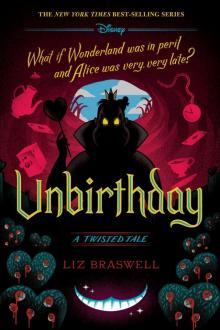 Unbirthday
Unbirthday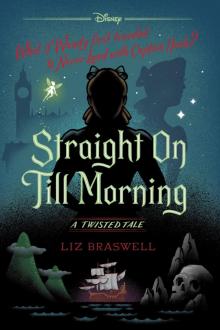 Straight On Till Morning
Straight On Till Morning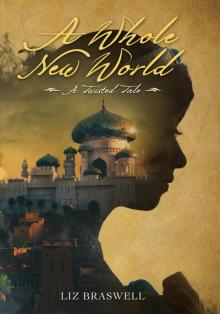 A Whole New World
A Whole New World Once Upon a Dream
Once Upon a Dream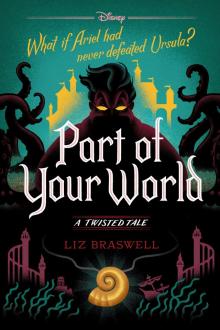 Part of Your World
Part of Your World Nine Lives of Chloe King
Nine Lives of Chloe King The Fallen
The Fallen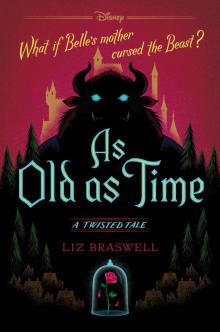 As Old As Time: A Twisted Tale (Twisted Tale, A)
As Old As Time: A Twisted Tale (Twisted Tale, A)